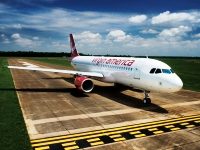US carrier Virgin America has made an official application to the US Department of Transportation (DOT) for permission to launch flights between San Francisco and Licenciado Gustavo Diaz Ordaz International Airport in Puerto Vallarta, the Mexican balneario resort city situated on the Pacific Ocean's Bahía de Banderas. The airline is planning a five times weekly service from December 2 using a 146-seat Airbus A320 (eight First Class and 138 Economy seats), subject to approval from the US and Mexican authorities, although it notes that its Winter Schedule and will vary seasonally.
If approved, Virgin America will be the third US carrier to operate on the route. Although many international air service agreements generally limit designated operators to two airlines from each country, the 2005 US-Mexico Agreement permitted three US carriers to provide direct-carrier (own aircraft) service on the route.
|
ANALYSIS: SAN FRANCISCO (SFO) - PUERTO VALLARTA (PVR) - bi-directional O&D traffic |
|||
|
Rank |
Airline |
Estimated O&D Passengers |
% Demand |
|
1 |
Alaska Airlines |
71,168 |
66.8 % |
|
2 |
United Airlines |
12,718 |
11.9 % |
|
3 |
Mexicana |
9,161 |
8.6 % |
|
4 |
US Airways |
4,613 |
4.3 % |
|
5 |
Continental Airlines |
3,306 |
2.8 % |
|
(others) |
5,887 |
5.5 % |
|
|
TOTAL |
106,586 |
- |
|
As the table above illustrates, Alaska Airlines currently dominates the market with a 66.8 per cent share of the 107,000 O&D passengers that travelled on the route in the past year on its own daily flight. United Airlines offers a three times weekly rotation, handling a 12 per cent share of the traffic. Mexicana had previously also served the route prior to its demise, although no other Mexican entrant has subsequently entered the market following its closure.
The arrival of Virgin America will certainly reduce fares on the route, a development it highlights in its DOT application. According to the carrier its flights on many US domestic routes has resulted in air fares falling by between a third and a fifth. For example between New York and Los Angeles and San Francisco it says average fares have reduced by up to 31 per cent (see below). These figures will obviously show the biggest price differences on the particular routes during only a selected period of time.
|
AVERAGE FARE REDUCTIONS FOLLOWING VIRGIN AMERICA ENTRY INTO SERVICE |
||
|
Market |
Average Fare Reduction |
Period |
|
Los Angeles (LAX) – San Francisco (SFO) |
-31 % |
2Q2009 v 2007 |
|
San Francisco (SFO) – New York (JFK) |
-31 % |
2Q2009 v 2007 |
|
Los Angeles (LAX) – Washington Dulles (IAD) |
-23 % |
2Q2009 v 2007 |
|
San Francisco (SFO) – Washington Dulles (IAD) |
-32 % |
2Q2009 v 2007 |
|
Los Angeles (LAX) – Boston Logan (BOS) |
-29 % |
4Q2009 v 4Q2008 |
|
San Francisco (SFO) – Boston Logan (BOS) |
-23 % |
4Q2009 v 4Q2008 |
Source: Virgin America, US DOT Application
The average fare on the San Francisco – Puerto Vallarta route in the past year, according to IATA data, was $225, up from $205 in the previous 12 month period, but both Alaska Airlines and United Airlines will be braced for yields to again slip if Virgin America enters the market.
According to Virgin America the new link would add 76,129 annual seats to the market, and is projected to grow demand for travel between San Francisco and Puerto Vallarta by as much as 48 per cent, or an increase of nearly 55,133 local passengers annually (about 76 passengers per day each way). Virgin America is already active in the Mexican market on a small scale. It is currently offering five flights a week to Cancun from Los Angeles and three services from San Francisco as well as a daily link to San Jose Del Cabo from San Francisco, accounting for just a 0.3 per cent share of the 16.1 million O&D passengers flying between Mexico and the US every year.
Virgin America is already active in the Mexican market on a small scale. It is currently offering five flights a week to Cancun from Los Angeles and three services from San Francisco as well as a daily link to San Jose Del Cabo from San Francisco, accounting for just a 0.3 per cent share of the 16.1 million O&D passengers flying between Mexico and the US every year.
“We’ve seen a strong demand for travel to our Mexican destinations and we’re looking forward to giving our flyers another world-class leisure option,” said David Cush, President and Chief Executive Officer, Virgin America. “We’re proud to be growing and offering travellers a very unique flight experience at a time when most airlines are shrinking their schedules and reducing the amenities provided to flyers.”





